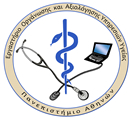Symptoms
1st stage (1-2 weeks):
 1. Dry cough initially at night 1. Dry cough initially at night
|
| |
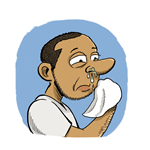 2. Nasal discharge 2. Nasal discharge
|
2nd stage (1-6 weeks)
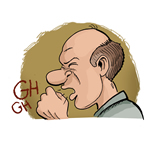 1. Episodes of intense spastic cough 1. Episodes of intense spastic cough
|
| |
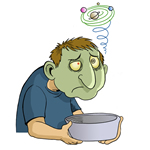 2. Vomiting following coughing fits 2. Vomiting following coughing fits
|
| |
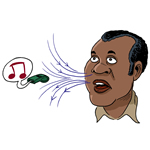 3. A whooping sound when the patient breaths in 3. A whooping sound when the patient breaths in
|
| |
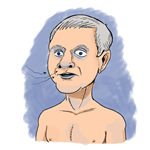 4. Cyanosis (blue or purple skin) due to apnea 4. Cyanosis (blue or purple skin) due to apnea
|
3rd stage (2-3 weeks)
 1. Milder cough (episodes are less frequent and finally stop) 1. Milder cough (episodes are less frequent and finally stop)
|
| |
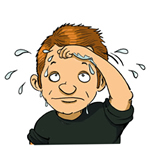 2. Low-grade fever (not always) 2. Low-grade fever (not always)
|
The most common complication is pneumonia while a very severe complication is pertussis encephalopathy (seizures, coma). Other less severe complications of pertussis are otitis media (ear inflammation), loss of appetite and dehydration.
Transmission
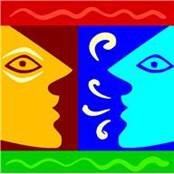 Pertussis is spread very easily. It is transmitted either by airborne droplets or by direct contact with respiratory secretions of infected persons.
Pertussis is spread very easily. It is transmitted either by airborne droplets or by direct contact with respiratory secretions of infected persons.
Treatment
For the treatment of pertussis seek medical assistance. Infants may require hospital admission. Rest, lots of fluids in order to avoid dehydration, and cleaning of the secretions or vomit during cough, so as to avoid spreading, are recommended. Ibuprofen or paracetamol may be used for the relief of other symptoms such as fever and sore throat. Do not give aspirin to children younger than 16 years.
Prevention
-
Vaccination
-
Patients with established pertussis should be isolated
-
A person infected with pertussis should stay away from infants and children, in particular when non-immunized, until the patient has taken antibiotics for at least 5 days
-
Young kids under 7 years who have not had all doses of the vaccine or are non-immunized, should stay off school, nursery or public gatherings for up to 21 days (ask your doctor's advice)
-
Anyone who comes into contact with a person having pertussis should be checked as to immunization status. Children who come into contact with a patient with pertussis, should be vaccinated. A 7-day regimen with antibiotics is recommended to anyone who comes into close contact with the patient and has in their home a child younger than 1 year old
-
Pregnant women who presented pertussis in the last 3 weeks before childbirth risk infecting their newborn babies and are recommended to take antibiotics
When to seek medical advice
Call your doctor if you develop any of the above mentioned symptoms or if you or your child has come into contact with a patient with pertussis.
Vaccines
Τhe vaccine against pertussis is administered as part of the vaccines against diphtheria and tetanus as a triple vaccine (DTaP) or as part of other vaccines during 2, 4, 6, 15-18 months of age and then at 4-6 years.
References
keelpno
nhs
 Pertussis is spread very easily. It is transmitted either by airborne droplets or by direct contact with respiratory secretions of infected persons.
Pertussis is spread very easily. It is transmitted either by airborne droplets or by direct contact with respiratory secretions of infected persons.














